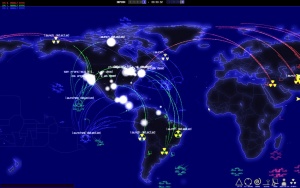Defcon (video game)
|
Defcon is a multiplayer nuclear war strategizing game for Windows, Mac, and Linux, developed by Introversion Software and published by Encore Software and Pinnacle Entertainment Group. The game was released on Steam on September 29, 2006 [1]. Ethical computer game design, along with violence, are at the base of the ethical issues concerning Defcon.
Contents
Gameplay
In Defcon, each player is given control of a continent on Earth and given the same number of people to rule over. Along with the continent of people, come a variety of military resources they must place such as nuclear silos, radars, naval fleets, and air force bases. The game incorporates a Defcon timer that counts down from Defcon 5 to Defcon 1. Over Defcon 5 and Defcon 4, the player may place their military resources but not engage in battle. Once Defcon 3 is hit, players may engage in battle over typical military means but not in nuclear warfare. The typical military warfare continues until Defcon 1 is hit, when the players may engage in nuclear warfare. The player may also create strategic alliances with other players through the use of in-game chatting systems that allow the player to use their allies' radars to learn more about locations of enemies.
Throughout the game the player aims to kill as many people as possible all while keeping to the other objective of the game; to have the greatest number of people remaining in their country among all the players. After a set amount of the total number of the nukes are deployed, Defcon 1 ends and the final battles are had within a last-minute timer. The typical game will last around 45 minutes.
Alternate Game Modes
Office Mode
In Office Mode, Defcon runs in silent mode and behind the main desktop. The game runs in real-time and silent notifications are given whenever a key event happens in the game. This mode lasts much longer than a regular game because the regular game mode has a slower clock. The mode is designed to run in as long as a typical workday.
Speed Defcon
In Speed Mode, Defcon runs with a much faster clock and the game lasts a fraction of the time of a regular game.
Diplomacy
In Diplomacy, all players start the game as part of an alliance. The game then progresses as players began to betray the alliance in order to win the game.
BigWorld
In BigWorld mode, a bigger earth is simulated by decreasing the range and speed of a players’ military resources but at the same time increasing the number of military resources by a factor of 2. This, in turn, creates a much longer game time.
Ethical Concerns in Defcon
Defcon, much like other computer games, bring up the issue of ethical game design. Like most games, there is a free reign to choose what you want to do within the game; such as when performing ethical decisions. However, game researcher Miguel Sicart, argues that due to Defcon’s game design, where killing the most amount of people possible results in winning, Defcon players lose this possibility to make an informed ethical decision[2]. His argument centered around the winning condition of the game, where players must gain the most amount of points in order to win; which in turn, means launching the most nukes and killing the most amount of people to gain said points[2]. He argues that, As a result, players begin to kill without thinking of the ethical concerns of nuclear fallout because they are just doing what needs to be done to win the game[2]. Overtime, players are constrained to playing to these rules; rules that have no negative reaction to these nuclear launches. This results in, what researchers say, players of the game to believe that what they are doing is not evil [2].
Sicart also argues that more ethical decisions constrained by the game’s rules are decisions made within the alliance feature[2]. Players are free to decide whether they want to make an alliance or not. Some players make want to make the ethical decision of getting in alliances in order to avoid the mutual destruction of the world or just to gain intelligence about enemy troops. According to Sicart, However, this again is constrained by the winning condition; where the players must kill as many people as they can while keeping their own alive. Therefore, the player is always rerouted to lying and breaking alliances in order to win [2].
These kinds of ethical loopholes are at the base of video games that are dubbed by some as violent and what people in the industry are being critiqued about. Some examples of other video games that are popularly described by some as violent and incentivize killing are Call of Duty, Counter-Strike: Global Offensive, and Grand Theft Auto. People in the industry continue to advocate against this violence.

